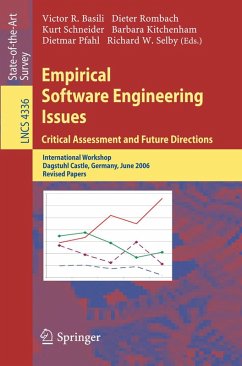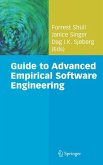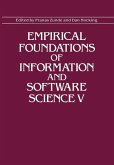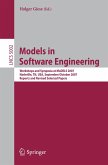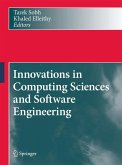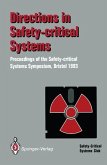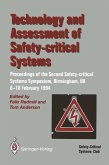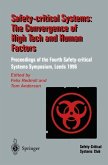Empirical Software Engineering Issues. Critical Assessment and Future Directions (eBook, PDF)
International Workshop, Dagstuhl Castle, Germany, June 26-30, 2006, Revised Papers
Redaktion: Basili, Victor; Selby, Richard; Pfahl, Dietmar; Kitchenham, Barbara; Schneider, Kurt; Rombach, Dieter
40,95 €
40,95 €
inkl. MwSt.
Sofort per Download lieferbar

20 °P sammeln
40,95 €
Als Download kaufen

40,95 €
inkl. MwSt.
Sofort per Download lieferbar

20 °P sammeln
Jetzt verschenken
Alle Infos zum eBook verschenken
40,95 €
inkl. MwSt.
Sofort per Download lieferbar
Alle Infos zum eBook verschenken

20 °P sammeln
Empirical Software Engineering Issues. Critical Assessment and Future Directions (eBook, PDF)
International Workshop, Dagstuhl Castle, Germany, June 26-30, 2006, Revised Papers
Redaktion: Basili, Victor; Selby, Richard; Pfahl, Dietmar; Kitchenham, Barbara; Schneider, Kurt; Rombach, Dieter
- Format: PDF
- Merkliste
- Auf die Merkliste
- Bewerten Bewerten
- Teilen
- Produkt teilen
- Produkterinnerung
- Produkterinnerung

Bitte loggen Sie sich zunächst in Ihr Kundenkonto ein oder registrieren Sie sich bei
bücher.de, um das eBook-Abo tolino select nutzen zu können.
Hier können Sie sich einloggen
Hier können Sie sich einloggen
Sie sind bereits eingeloggt. Klicken Sie auf 2. tolino select Abo, um fortzufahren.

Bitte loggen Sie sich zunächst in Ihr Kundenkonto ein oder registrieren Sie sich bei bücher.de, um das eBook-Abo tolino select nutzen zu können.
This book constitutes the thoroughly refereed post-proceedings of the International Dagstuhl-Seminar on Empirical Software Engineering, held in Dagstuhl Castle, Germany in June 2006. The 54 revised full papers in this state-of-the-art survey are organized in topical sections on the empirical paradigm, measurement and model building, technology transfer and education, as well as roadmapping.
- Geräte: PC
- ohne Kopierschutz
- eBook Hilfe
- Größe: 2.89MB
Andere Kunden interessierten sich auch für
![Guide to Advanced Empirical Software Engineering (eBook, PDF) Guide to Advanced Empirical Software Engineering (eBook, PDF)]() Guide to Advanced Empirical Software Engineering (eBook, PDF)121,95 €
Guide to Advanced Empirical Software Engineering (eBook, PDF)121,95 €![Empirical Foundations of Information and Software Science V (eBook, PDF) Empirical Foundations of Information and Software Science V (eBook, PDF)]() Empirical Foundations of Information and Software Science V (eBook, PDF)40,95 €
Empirical Foundations of Information and Software Science V (eBook, PDF)40,95 €![Models in Software Engineering (eBook, PDF) Models in Software Engineering (eBook, PDF)]() Holger GieseModels in Software Engineering (eBook, PDF)40,95 €
Holger GieseModels in Software Engineering (eBook, PDF)40,95 €![Innovations in Computing Sciences and Software Engineering (eBook, PDF) Innovations in Computing Sciences and Software Engineering (eBook, PDF)]() Innovations in Computing Sciences and Software Engineering (eBook, PDF)161,95 €
Innovations in Computing Sciences and Software Engineering (eBook, PDF)161,95 €![Directions in Safety-Critical Systems (eBook, PDF) Directions in Safety-Critical Systems (eBook, PDF)]() Directions in Safety-Critical Systems (eBook, PDF)40,95 €
Directions in Safety-Critical Systems (eBook, PDF)40,95 €![Technology and Assessment of Safety-Critical Systems (eBook, PDF) Technology and Assessment of Safety-Critical Systems (eBook, PDF)]() Technology and Assessment of Safety-Critical Systems (eBook, PDF)40,95 €
Technology and Assessment of Safety-Critical Systems (eBook, PDF)40,95 €![Safety-Critical Systems: The Convergence of High Tech and Human Factors (eBook, PDF) Safety-Critical Systems: The Convergence of High Tech and Human Factors (eBook, PDF)]() Safety-Critical Systems: The Convergence of High Tech and Human Factors (eBook, PDF)73,95 €
Safety-Critical Systems: The Convergence of High Tech and Human Factors (eBook, PDF)73,95 €-
-
-
This book constitutes the thoroughly refereed post-proceedings of the International Dagstuhl-Seminar on Empirical Software Engineering, held in Dagstuhl Castle, Germany in June 2006. The 54 revised full papers in this state-of-the-art survey are organized in topical sections on the empirical paradigm, measurement and model building, technology transfer and education, as well as roadmapping.
Dieser Download kann aus rechtlichen Gründen nur mit Rechnungsadresse in A, B, BG, CY, CZ, D, DK, EW, E, FIN, F, GR, HR, H, IRL, I, LT, L, LR, M, NL, PL, P, R, S, SLO, SK ausgeliefert werden.
Produktdetails
- Produktdetails
- Verlag: Springer Berlin Heidelberg
- Seitenzahl: 196
- Erscheinungstermin: 11. Juni 2007
- Englisch
- ISBN-13: 9783540713012
- Artikelnr.: 44126581
- Verlag: Springer Berlin Heidelberg
- Seitenzahl: 196
- Erscheinungstermin: 11. Juni 2007
- Englisch
- ISBN-13: 9783540713012
- Artikelnr.: 44126581
- Herstellerkennzeichnung Die Herstellerinformationen sind derzeit nicht verfügbar.
Dr. Kurt Schneider leitet das Fachgebiet Software Engineering an der Leibniz Universität Hannover. Er hat in Erlangen Informatik studiert und anschließend an der Universität Stuttgart promoviert. Bei einem Forschungsaufenthalt an der University of Colorado at Boulder beschäftigte er sich mit Techniken zum systematischen Lernen aus Erfahrung im Software Engineering. Er war sieben Jahre bei der DaimlerChrysler AG am Forschungszentrum Ulm tätig. In Projekten mit verschiedenen Unternehmensbereichen spielten Softwarequalität, Prozessgestaltung und wiederum die Erfahrungsnutzung eine wichtige Rolle. Zu seinen Forschungsthemen gehören daneben Softwareanforderungen und agile Methoden, um Informationsflüsse und Dokumentationen in Softwareprojekten zu optimieren. Kurt Schneider legt viel Wert darauf, diese Themen praxisnah zu bearbeiten und vermitteln.
Prof. Dr. Dieter Rombach - und Prof. Dr. Peter Liggesmeyer - sind Lehrstuhlinhaber für Software Engineering an der TU Kaiserslautern. Sie leiten gemeinsam das Fraunhofer Institut für Experimentelles Software Engineering.
Prof. Dr. Dieter Rombach - und Prof. Dr. Peter Liggesmeyer - sind Lehrstuhlinhaber für Software Engineering an der TU Kaiserslautern. Sie leiten gemeinsam das Fraunhofer Institut für Experimentelles Software Engineering.
Session 1 The Empirical Paradigm.- The Empirical Paradigm Introduction .- Approaches for Empirical Validation.- Techniques for Empirical Validation.- Status of Empirical Research in Software Engineering.- Position Papers.- Aggregation of Empirical Evidence.- Empirical Evaluation in Software Engineering: Role, Strategy, and Limitations.- New Opportunities for Empirical Research.- Empirical Paradigm: Position Paper.- The Value of Empirical Evidence for Practitioners and Researchers.- Exploration Versus Confirmation.- Empirical Paradigm - The Role of Experiments.- The Role of Controlled Experiments in Software Engineering Research.- Position Papers.- Creating Real Value in Software Engineering Experiments.- From Silver Bullets to Philosophers' Stones: Who Wants to Be Just an Empiricist?.- Social and Human Aspects of Software Engineering.- Longitudinal Studies in Evidence-Based Software Engineering.- The Use of Grounded Theory in Empirical Software Engineering.- Historical Review.- Exploration and Confirmation: An Historical Perspective.- Working Group Results.- Combining Study Designs and Techniques Working Group Results.- Optimizing Return-On-Investment (ROI) for Empirical Software Engineering Studies Working Group Results.- The Role of Controlled Experiments Working Group Results.- Discussion and Summary.- The Empirical Paradigm Discussion and Summary.- Session 2 Measurement and Model Building.- Measurement and Model Building Introduction.- Data Sharing.- Data Collection, Analysis, and Sharing Strategies for Enabling Software Measurement and Model Building.- Knowledge Acquisition in Software Engineering Requires Sharing of Data and Artifacts.- Effective Data Interpretation.- Effective Data Interpretation.- Software Support Tools and Experimental Work.- PositionPapers.- Measurement and Interpretation of Productivity and Functional Correctness.- Synthesising Research Results.- On the Quality of Data.- Working Group Results.- Potential of Open Source Systems as Project Repositories for Empirical Studies Working Group Results.- Data Sharing Enabling Technologies Working Group Results.- Documenting Theories Working Group Results.- Discussion and Summary.- Measurement and Model Building Discussion and Summary.- Session 3 Technology Transfer and Education.- Technology Transfer and Education Introduction.- Technology Transfer.- Empirical Studies as a Basis for Technology Transfer.- Position Papers.- Relationships and Responsibilities of Software Experimentation.- The (Practical) Importance of SE Experiments.- How to Improve the Use of Controlled Experiments as a Means for Early Technology Transfer.- Extending Empirical Studies to Cover More Realistic Industrial Development and Project Management Issues.- Empirical Case Studies in Industry: Some Thoughts.- Software Process Simulation Frameworks in Support of Packaging and Transferring Empirical Evidence.- Structuring Families of Industrial Case Studies.- Education.- Empirical Software Engineering: Teaching Methods and Conducting Studies.- Educational Objectives for Empirical Methods.- Position Papers.- On "Landscaping" and Influence of Empirical Studies.- Involving Industry Professionals in Empirical Studies with Students.- Working Group Results.- Industry-Research Collaboration Working Group Results .- Teaching Empirical Methods to Undergraduate Students Working Group Results.- Discussion and Summary.- Technology Transfer and Education Discussion and Summary.- Roadmapping.- Empirical Software Engineering Research Roadmap Introduction.- Working Group Results.- Roadmapping WorkingGroup 1 Results.- Roadmapping Working Group 2 Results.- Roadmapping Working Group 3 Results.- Roadmapping Working Group 4 Results.- Discussion and Summary.- Empirical Software Engineering Research Roadmap Discussion and Summary.
Session 1 The Empirical Paradigm.- The Empirical Paradigm Introduction .- Approaches for Empirical Validation.- Techniques for Empirical Validation.- Status of Empirical Research in Software Engineering.- Position Papers.- Aggregation of Empirical Evidence.- Empirical Evaluation in Software Engineering: Role, Strategy, and Limitations.- New Opportunities for Empirical Research.- Empirical Paradigm: Position Paper.- The Value of Empirical Evidence for Practitioners and Researchers.- Exploration Versus Confirmation.- Empirical Paradigm - The Role of Experiments.- The Role of Controlled Experiments in Software Engineering Research.- Position Papers.- Creating Real Value in Software Engineering Experiments.- From Silver Bullets to Philosophers' Stones: Who Wants to Be Just an Empiricist?.- Social and Human Aspects of Software Engineering.- Longitudinal Studies in Evidence-Based Software Engineering.- The Use of Grounded Theory in Empirical Software Engineering.- Historical Review.- Exploration and Confirmation: An Historical Perspective.- Working Group Results.- Combining Study Designs and Techniques Working Group Results.- Optimizing Return-On-Investment (ROI) for Empirical Software Engineering Studies Working Group Results.- The Role of Controlled Experiments Working Group Results.- Discussion and Summary.- The Empirical Paradigm Discussion and Summary.- Session 2 Measurement and Model Building.- Measurement and Model Building Introduction.- Data Sharing.- Data Collection, Analysis, and Sharing Strategies for Enabling Software Measurement and Model Building.- Knowledge Acquisition in Software Engineering Requires Sharing of Data and Artifacts.- Effective Data Interpretation.- Effective Data Interpretation.- Software Support Tools and Experimental Work.- PositionPapers.- Measurement and Interpretation of Productivity and Functional Correctness.- Synthesising Research Results.- On the Quality of Data.- Working Group Results.- Potential of Open Source Systems as Project Repositories for Empirical Studies Working Group Results.- Data Sharing Enabling Technologies Working Group Results.- Documenting Theories Working Group Results.- Discussion and Summary.- Measurement and Model Building Discussion and Summary.- Session 3 Technology Transfer and Education.- Technology Transfer and Education Introduction.- Technology Transfer.- Empirical Studies as a Basis for Technology Transfer.- Position Papers.- Relationships and Responsibilities of Software Experimentation.- The (Practical) Importance of SE Experiments.- How to Improve the Use of Controlled Experiments as a Means for Early Technology Transfer.- Extending Empirical Studies to Cover More Realistic Industrial Development and Project Management Issues.- Empirical Case Studies in Industry: Some Thoughts.- Software Process Simulation Frameworks in Support of Packaging and Transferring Empirical Evidence.- Structuring Families of Industrial Case Studies.- Education.- Empirical Software Engineering: Teaching Methods and Conducting Studies.- Educational Objectives for Empirical Methods.- Position Papers.- On "Landscaping" and Influence of Empirical Studies.- Involving Industry Professionals in Empirical Studies with Students.- Working Group Results.- Industry-Research Collaboration Working Group Results .- Teaching Empirical Methods to Undergraduate Students Working Group Results.- Discussion and Summary.- Technology Transfer and Education Discussion and Summary.- Roadmapping.- Empirical Software Engineering Research Roadmap Introduction.- Working Group Results.- Roadmapping WorkingGroup 1 Results.- Roadmapping Working Group 2 Results.- Roadmapping Working Group 3 Results.- Roadmapping Working Group 4 Results.- Discussion and Summary.- Empirical Software Engineering Research Roadmap Discussion and Summary.
